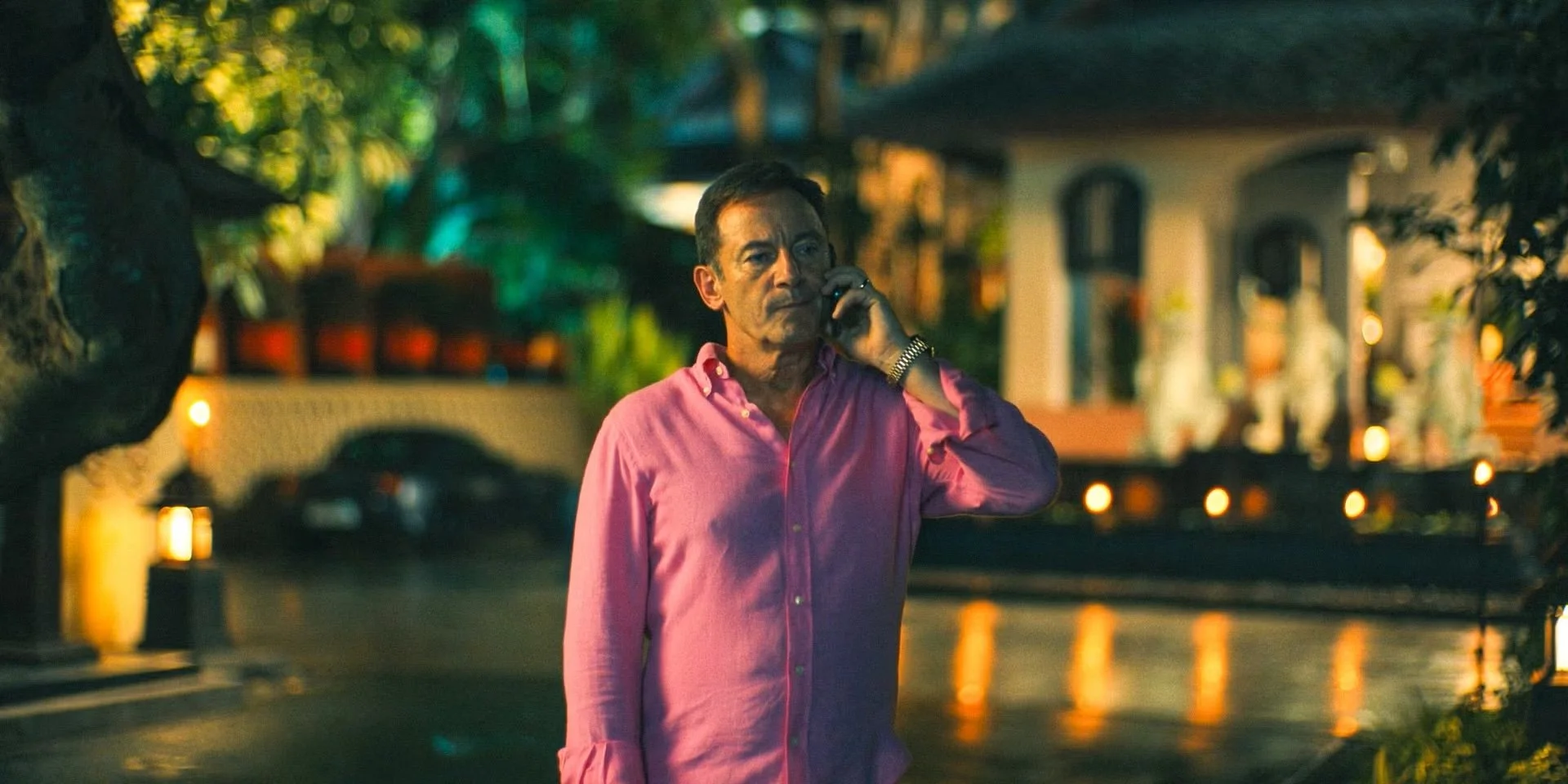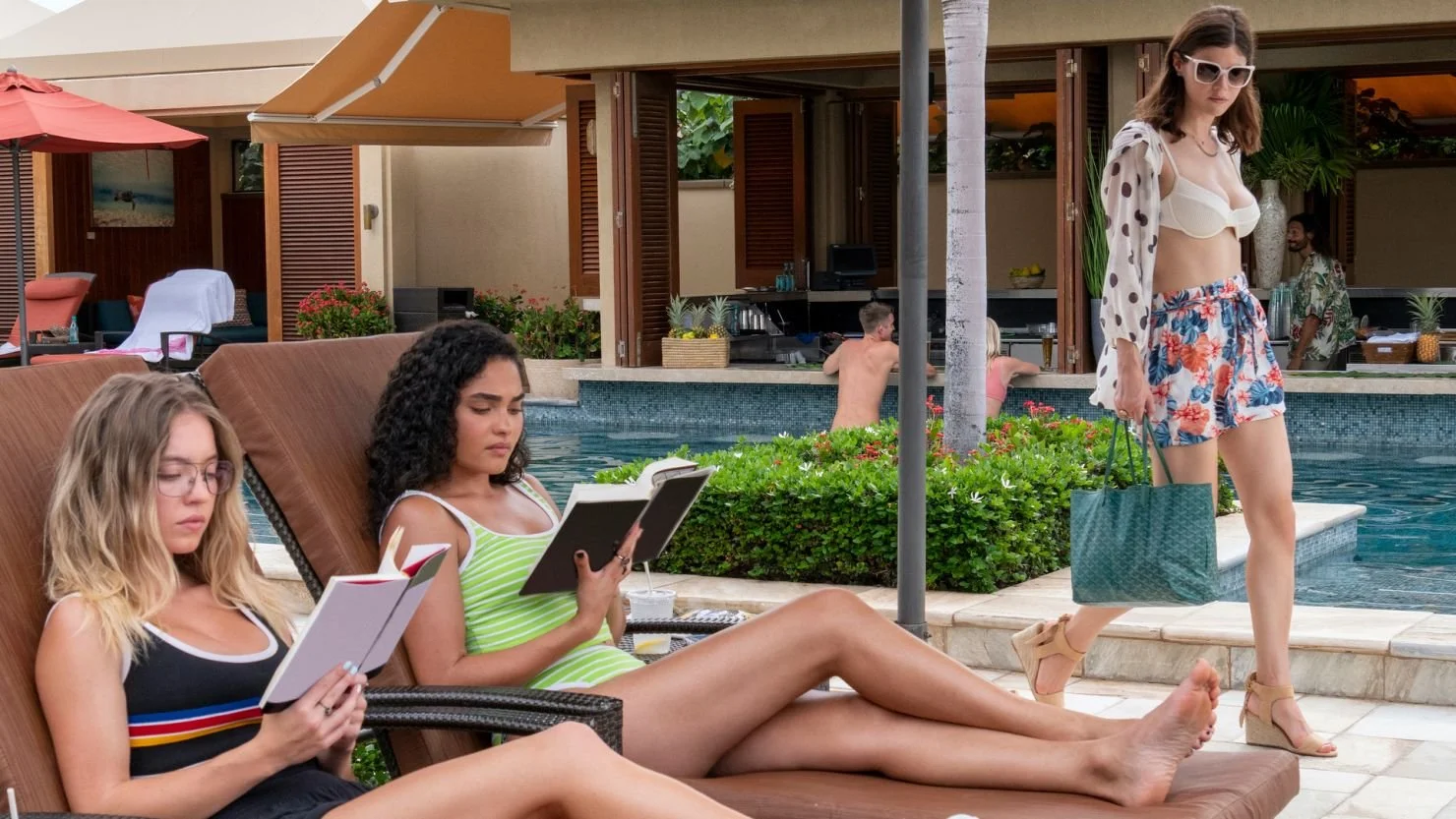Continue Reading
Biggest Finance Newsletter for Women
Join 200,000 other people interested in money, power, culture, and class.
Subscribe
This essay contains copious White Lotus season 3 spoilers. If you’re not caught up, please stop whatever else you’re doing and go spend the next eight hours in front of your TV, which is the only screen we’re celebrating today.
Timothy Ratliff is screwed.
While on vacation at a fictional resort in Thailand called the White Lotus (filmed at the real Four Seasons Koh Samui, where the Ratliffs’ “Three Bedroom Residence Villa with Pool” will set you back an astonishing $10,349 per night), our friend Tim finds out the FBI is ransacking his office in connection to his involvement with a money laundering operation. (“And I only made $10 million out of your stupid fucking scheme? Fuck!” he shouts at his co-conspirator from 11 timezones away.) This is one of the subplots of the third season of HBO’s White Lotus, a show which is mostly about power dynamics and rich people behaving badly in beautiful places, a “class satire” about “social climbing” and the necks that typically get stepped on in pursuit of ascension.

While I’ve never tried my hand at money laundering (and I’d never deign to put the word “only” ahead of “$10 million”), there was something uncomfortably familiar about Tim’s preoccupied state on vacation. Every time he deflected inquiries from his family about why he seemed so stressed and absent, stalking off with his sweaty palm wrapped around his phone, I winced with recognition. It had echoes (minus the federal investigation) of the half-dozen or so times I’d taken a whole week off work, only to catch a glimpse of a push notification that violently grounded my mental faculties in the deadlines, open requests, or—worst of all—negative feedback inherent to a job conducted in a digital office that can reach you wherever there’s cell service. This feeling intensified in lockstep with my earnings over the years; more than a day or two of time away felt not just risky, but wrong , when availability was technically possible and the obligations of real life continuously accrued behind a red badge app icon within arm’s reach.
In my experience, even if an intrusion didn’t require immediate tending, it still left a psychic residue that persisted for hours. My body may have been sitting in a beach chair facing the ocean, but my mind was buzzing around my inbox, crafting responses to disgruntled messages and playing calendar Jenga with time-sensitive appointments that had managed to pierce the veil of my autoresponder from halfway across the world. There I’d be, on some trip that was meticulously planned, saved for, and in some cases, required days of travel, only to find myself itching to sneak away to good WiFi so I could do the very thing from which I was supposedly taking a break.
This can have the unfortunate effect of making one paradoxically agitated with the break itself. There’s perhaps nobody to whom Tim vents more flashes of frustration than the hotel employee who keeps suggesting he surrender his phone to her tech gulag, a locked tote bag—it’s clear she’s seen his type before.
After he begins availing himself of his wife Victoria’s generously supplied Lorazepam stash to cope with the debilitating panic of his imminent arrest, he becomes even more withdrawn and vacant. The fact that not a single family member seems to clock this shift for days (or draw the obvious conclusion from her missing pills and his inability to open his mouth long enough to form multisyllabic sentences) is revealing in its own way. A totally distracted breadwinner on what is surely a six-figure family vacation is more or less standard for this family. In a conversation between Tim and his oldest son (and hopeful protégé) Saxon about why Saxon, too, cannot bear to sacrifice his laptop to the tech bag, the nature of these characters’ pursuit of money and success is revealed in sharper contrast. Saxon, who always looks like he just walked off the pages of a 2012 Vineyard Vines catalog, declares with a timing and tone impossible to convey in plain text, “I know I tell you this all the time, dad, but…I love working.” Despite his proximity to excessive wealth and the unreal experiences it can buy, Saxon is still early in his career and “unimportant” in the way he perceives his father to be. To him, being constantly connected is both a path to and symbol of success and legitimacy. (An especially funny juxtaposition given who, exactly, keeps trying to contact Tim, now that we know where his insatiable drive for power landed him.)
Saxon’s attitude, while a little sad, is understandable—and can even be practically useful. Even jobs that offer paid time off, a privilege in the US where one in four workers have none, often don’t reduce expectations of output accordingly. You may be lucky enough to score three weeks of vacation time per year, but there’s still 52 weeks’ worth of work expected. In response to this reality, 46% of Americans who are offered paid vacation time don’t use it all, with half of them citing the fear of “falling behind at work.” In that sense, the ability to luxuriate fully and fearlessly in unstructured time away is an elusive freedom; one that money struggles to buy.
In March, we ended up mushing two trips back to back: the first a family affair that lined up with our nieces’ spring break, the second to a place easily accessible from the West coast—Hawai’i—before we migrate closer to the center of the country again. I had never taken off two weeks in a row before, so I prepared by spending the month leading up to our indulgent travel binge working much longer hours than usual. As our departure date crept closer, I became fixated on how I was using my time: managing it, optimizing it, preparing myself to enjoy it. Because of how much work (and money) was going into making these adventures possible, the break became freighted with the expectation that I’d make the most of my time away; chiefly, by staying offline.
Time—or a lack thereof—is intimately connected to all manner of socioeconomic issues we don’t traditionally think of as bound by the strictures of the clock. The “Make America Healthy Again” preoccupation with food dyes and genetically modified organisms, for example, often misses that it is not the presence of cheap microwaveable meals, but the absence of time to prepare fresh food three times daily, that leaves many people eating things that aren’t as nutritious as they’d probably prefer. Another example comes in the form of the seemingly intractable gender wage gap, often attributed to a lopsided distribution of unpaid domestic labor, which data from other countries suggests has been softened and shrunk by the introduction of things like four-day work weeks or shortened working hours—allowing all workers more time to tend to their homes and the people in them.
When we welcomed a bounty of technologically enabled access into our lives, I don’t think many of us realized it meant not just access for us, but to us. (My mom was a rare holdout, refusing a smartphone until the 2020s: “I don’t want to be that easy to reach,” she’d often say.) The sense of having too little time can be another way of expressing the feeling of having too much of something else. For me, that “something else” often feels like a buzzing static of fragmented half-thoughts introduced by the portal of obligations and breaking news alerts most of us carry around all day, digital serfs paying cloud rent to the cyber kingdoms of tech billionaires in the currencies that matter most online: our time, our attention, our peace. A cottage industry—from the entire back catalog of writers like Cal Newport to apps like the appropriately named Freedom to wellness resorts that make you lock your phone in a sack—has developed to offer solutions for the human inability to resist this frenzied alienation and regain a sense of presence that’s been hijacked.
One morning while hiking on our trip, I caught wind that an error in some recently published material had started a skirmish that required me to remedy the mistake before it escalated further. I may have been “offline,” but my digital body double (and everything she’s ever said) was still accessible in another realm 24 hours per day. Cheeks suddenly warm and pulse thudding in my ears from the sense of overexposure (my standard physiological response to being publicly accused of stupidity, unfortunately), I rushed back to the car to focus on my tiny screen in silence. I thought of Tim, sneaking away from dinner to check his notifications in the bushes.

For much of our two-week travel bender, my sense of time warped under the influence of changing time zones, producing moments of genuine pleasure. While I had hoped for the purity of an unpunctured pause, I often haggled with recurrent flares of anxiety that everything I had left thousands of miles behind was still playing without me; that when I returned, I’d be on fast-forward until synced up again. (In the words of the paid time off study: “Fear of falling behind.”) But it’s also undeniable that several days of fewer than 30 minutes total screen time produced a startling mental clarity (and the sheepish embarrassment of embodying a cliché): Millennial Woman Finally Turns Off Phone and Knows Peace for First Time.
For our last meal before heading to the airport, we decided to visit the Four Seasons Wailea (where the first season of White Lotus was filmed). The poolside breakfast restaurant was bustling with people who could’ve easily been cast as extras: women with Connie Britton-blond blowouts, wrinkle-free foreheads, a rainbow of Hermès sandals on teen boys and older women alike, and silky swim coverups draped leisurely over taut pilates bodies. Men whose behavior seemed calibrated to project an air of harried importance took calls at breakfast while their families dined and chatted around them; I nearly broadsided one rushing to meet his seated wife and children after bellowing to the host he had been working that morning and needed something quick before he returned.
It was a caricature of the caricature portrayed in Mike White’s world, rendering the presentation of families like the Ratliffs something closer to a docuseries than a drama. Even here, at a beautiful beach resort surrounded by ocean on all sides for thousands of miles where a week-long stay costs the equivalent of six months median rent at a minimum, many still seemed clocked in by choice. It is a strange affluence of Faustian proportions in which one can afford a $2,000 nightly room rate, but cannot afford to eat breakfast without joining a conference call. I wonder what John Maynard Keynes, famed predictor of the late twentieth century 15-hour work week, would say. A life that permits you the most rarefied luxury of time freedom in theory but not in practice presents interesting questions about what “luxury” really means, though sitting at the Four Seasons Wailea, I felt pretty sure it wasn’t sitting by a pool responding to emails.
There’s a glut of research attempting to study the screen time habits of children and teenagers, which is sometimes found to be higher in low-income households—but there’s surprisingly little in the way of studies attempting to parse how adults’ relationships with the worlds in their devices are impacted by characteristics like income or wealth. The digital attention economy is, in many ways, an equal opportunity spiritual vampire, a rare feature of modern life that does not improve with socioeconomic standing. Extreme wealth can buy a room at the Four Seasons, but it can’t buy a less addictive iPhone.

As we wrapped up, our waiter, as if waiting for the meal to conclude before raising the subject, asked if we “had seen White Lotus.” Thomas and I exchanged a brief glance, telepathically negotiating whether we’d try to play it cool or admit it was the only reason we drove 30 minutes out of our way. “We’ve seen it!” Thomas responded, as though we hadn’t just been debating if the infamous Pineapple Suite was real over $37 of bacon and eggs. Fortunately, our restraint didn’t deter him. He immediately began ticking off production trivia: Most outdoor scenes were filmed at the adult pool up those stairs to the left. There’s no “Pineapple Suite” (but you can stay in its real-life equivalent, the “Maile Presidential Suite,” for $31,000 per night!). Jennifer Coolidge ate breakfast in that corner, sealed off from other guests. “There were real guests staying here while they filmed?” Thomas asked. “Yeah,” he replied, “They just blended right in.”
The equations of the “financial independence, retire early” movement translate time to money: The accumulation of investments worth 25x your annual expenses in tax-advantaged, low-cost index funds is, supposedly, the most direct way to buy your freedom. Something tells me that locked tech bag might be cheaper.
April 2, 2025
Paragraph
Looking for something?
Search all how-to, essays, and podcast episodes.
Explore
While I love diving into investing- and tax law-related data, I am not a financial professional. This is not financial advice, investing advice, or tax advice. The information on this website is for informational and recreational purposes only. Investment products discussed (ETFs, index funds, etc.) are for illustrative purposes only. It is not a recommendation to buy, sell, or otherwise transact in any of the products mentioned. Do your own due diligence. Past performance does not guarantee future returns.
Money with Katie, LLC.
Terms & Conditions | Privacy Policy
This Site Was Built by Brand Good Time



